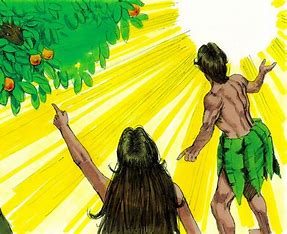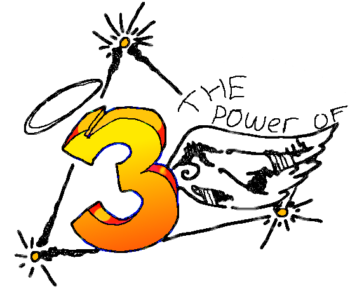 Spiritual Growth
Spiritual Growth
Seven Dispensations of Man – The Dispensation of Innocence
Join Me Live!
These teachings are conducted virtually on Wednesdays at 7:00pm Eastern Standard Time, United States.
Click the following link to register to join the RISE! eGroup live virtual class hosted by myself, Marilyn Moore.
Meet – RISE! Bible Study (google.com)
Dispensation Defined
This study is about the history of man within the confines of Time. This framework of man’s past, present and future from a biblical perspective, is divided into definitive periods called dispensations. The Greek word oikonomia is translated “dispensation” in several places in the Bible. Its base is from compound words “oikos” which means household in the sense of an estate and “nomos” which means law or rule. Combined, it refers to an estate manager or a steward that is put in charge of his master’s household. Man is the designated “steward” that was appointed to manage God’s “estate” (the earth). Because of the nature of the designation and God’s expectations, dispensations reveal the evolution of the relationship between God and man. The relationship is clearly understood by four elements contained in each dispensation.
Four Elements
- Focus on a people
- Highlighted events of the God-man relationship
- Judgment
- Promise of restoration
Dispensation Perspectives
The number of dispensations of which man’s history is divided will vary per perspective desired. Typically, from three to eight. Man’s history in three dispensations would lend itself to general observations whereas divisions of seven or eight would provide more detail. The seven-dispensation scheme is the focus in this study because its divisions are more informative.
The Seven Dispensations
- Innocence
- Conscience
- Human Government
- Promise or Patriarchal
- Law
- Grace
- Kingdom
We begin with the first dispensation, the Dispensation of Innocence. Because of the depth of content presented on certain events, each dispensation will be presented in separate writings for easier consumption.
Dispensation of Innocence
Time Period: From creation to the Fall of Adam (4004 BC – ??).
Bible Books Covered: Genesis 1-3
People Focus: Adam and Eve
God-Man Relationship: Man in communion with God
Highlighted Events:
- Creation of heaven, earth, plants, and animals
- Creation of Adam and Eve
- Man given dominion; made steward of the earth (Genesis 2:15)
- Man commanded not to eat from the Tree of Knowledge of Good and Evil (Genesis 2:16-17)
- Fall of Man

Genesis 3:6-11
6 When the woman saw that the fruit of the tree was good for food and pleasing to the eye, and also desirable for gaining wisdom, she took some and ate it. She also gave some to her husband, who was with her, and he ate it.
7 Then the eyes of both of them were opened, and they realized they were naked; so they sewed fig leaves together and made coverings for themselves.
8 Then the man and his wife heard the sound of the Lord God as he was walking in the garden in the cool of the day, and they hid from the Lord God among the trees of the garden.
9 But the Lord God called to the man, “Where are you?”
10 He answered, “I heard you in the garden, and I was afraid because I was naked; so I hid.”
11 And he said, “Who told you that you were naked? Have you eaten from the tree that I commanded you not to eat from?”

When Adam and Eve became “enlightened”, they knew they were naked and became ashamed so they hid.
What was it about gaining knowledge of good and evil that made them feel ashamed to be naked when they weren’t before?
Genesis 2:25
25 Adam and his wife were both naked, and they felt no shame
Adam and Eve were innocently naked just as a toddler would be as he walks around in the house without any clothes on. The toddler’s thoughts are pure and wholesome. However, he soon learns not to strut his stuff as he is informed there is something wrong with doing that. He is instructed as such based on the parents’ knowledge of good and evil or what they consider decent and indecent. This knowledge is imposed on the toddler where eventually he adopts similar associations.
Before Adam and Eve ate from the tree, they were not ashamed of their nakedness. However, the knowledge of evil brought a different perspective to nakedness that made them feel exposed, wrong, and blaringly estranged from God. They felt the need to cover up. Their innocent perspective became contaminated and was now tainted with shame and guilt.
Sin Pollutes
Once sin entered it took what was beautifully innocent and added a sense of lewdness and vulgarity so that the exact same state that was of no import before now became shameful and something to hide. This is a stark illustration of what sin does to innocence. There is no such thing as a sin that does no damage. It always destroys in some way. The damage may not be immediately evident but its consequences will eventually reveal themselves.
The Relationship Spoiler: Disobedience
Curses Pronounced:
Did you have that kind of momma when the kids are misbehaving she comes in the room and everyone is blaming the other? Well, she resolves the issue…EVERYBODY gets a ‘whooping’! Momma must have taken her cue from God, for God gave EVERYBODY in the Garden a ‘whooping’!
Serpent’s Curse
- You will crawl on your belly and eat dust all the days of your life (Genesis 3:14).
Was the serpent Satan?
No.
Then why was the serpent cursed?
The serpent was cursed because he was a conduit for evil.
What does this imply?
It implies penalty is meted out to those who make themselves available or leave themselves open for sin to be introduced through them.
Satan’s Curse
- Man’s seed will eventually destroy you.
Genesis 3:14-15
14 So the Lord God said to the serpent…
15 And I will put enmity [ill-will, hatred] between you and the woman, and between your offspring and hers; he will crush your head, and you will strike his heel.”
Verse 14 shows that God was talking to the serpent metaphorically but his words were directed at Satan.
Can Satan possess a body, animal or human?
No, he was created a cherub (an angel). He is not a spirit nor is he omnipresent (everywhere at all times). However, demon spirits, his offspring (Ephesians 6:12), can occupy bodies (Mark 5:8-13).
Another name for Satan is Beelzebul, prince of demons, (Mark 3:22; Matt 12:24; Luke 11:15).
Who else was metaphorically referred to as Satan?
Pharisees in Matthew 12:34 are called vipers, an animal symbolic of Satan, because they opposed the gospel.
Peter in Matthew 16:21-23 was called Satan as well because his ideation, although well intended, opposed the things of God. Satan can introduce thoughts that are contrary to God’s plan, so even Christians must be careful what they speak or support.
We can conclude that any idea or thought that opposes the divine will of God is authored by Satan regardless of who speaks it!
Eve’s Curse
- Childbearing will be painful.
- You are now subject to your husband.
Genesis 3:16
16 To the woman he said, “I will make your pains in childbearing very severe; with painful labor you will give birth to children.
Your desire will be for your husband, and he will rule over you.”
This judgement implies that previously there was no need for Eve to be subject to Adam. Sin changed things.
This judgement was echoed in the New Testament as well (Ephesians 5:24).
Adam’s Curse
- The ground is cursed and will yield her bounty only through toil and sweat.
- No access to the Tree of Life, man will die.
Genesis 3:17-19
17 To Adam he said, “Because you listened to your wife and ate fruit from the tree about which I commanded you, ‘You must not eat from it,’ “Cursed is the ground because of you; through painful toil you will eat food from it all the days of your life.
18 It will produce thorns and thistles for you, and you will eat the plants of the field.
19 By the sweat of your brow you will eat your food until you return to the ground, since from it you were taken; for dust you are and to dust you will return.”
Remember food was readily available in the Garden of Eden. God is saying, “You want to be God like me? Then provide food and shelter for yourself. Let’s see how that works out for you!”
The Judgement:
Expulsion of humanity from the Garden of Eden

Genesis 3:21-24
21 The Lord God made garments of skin for Adam and his wife and clothed them
22 And the Lord God said, “The man has now become like one of us, knowing good and evil. He must not be allowed to reach out his hand and take also from the tree of life and eat, and live forever.”
23 So the Lord God banished him from the Garden of Eden to work the ground from which he had been taken.
24 After he drove the man out, he placed on the east side of the Garden of Eden cherubim and a flaming sword flashing back and forth to guard the way to the tree of life.
- Precursor to animal sacrifices to cover man’s sin [nakedness] offered by the high priest once a year.
- Separation from God.
- No longer has access to the Tree of Life, death is eminent.
The Promise:
The Adamic Covenant
The promise is embedded in the Adamic Covenant, an agreement between God and man. This covenant came in two parts. The first part was that of works and obedience (Genesis 2:15-17). That man would work the garden and not eat of the forbidden fruit. The second part was made necessary by the violation of the first. After taking of the forbidden fruit, man is now out of good standing with God. God doesn’t leave him there but promises to make a way for reconciliation through the redemptive work of Jesus Christ, Genesis 3:15.
Genesis 3:15
15 And I will put enmity [ill-will, hatred] between you and the woman, and between your offspring and hers; he will crush your head, and you will strike his heel.”
Out of this curse came a Promise. Jesus will defeat Satan although Satan will “bruise” Jesus causing his life to be taken (although we know that it was His to give up). Satan would get some licks in however a bruise is not permanent, neither was Jesus’ death. He got up! This shows that God had already crafted a plan to bring mankind back into relationship with Him.
Summary:
Adam was given stewardship over the earth and everything in it. He succumbed to the influence of darkness which propelled mankind in a trajectory of great sin. But God’s love put another man in place, the second man Adam, a sleeper agent of sorts, who at the appointed time would be activated not only to take away the sins of those present but the sins of those past, present and future thus restoring the relationship between God and all of mankind.
Next Dispensation: The Dispensation of Conscience
References
Thompson, Alfred. The New “Panorama” Bible Study Course “A Visual Aid to Bible Study”
What the Bible says about Nakedness as Innocence and Vulnerability (bibletools.org)vRetrieved 6/3/23
What Is the Adamic Covenant? (christianity.com) Retrieved on 6/3/23
Microsoft Word – Seven Covenants PT 8 – The Adamic Covenant (b5z.net) Retrieved on 6/3/23
Dispensational Bible Study – Grace Bible Church Fort Worth (gracebiblechurch-fw.com) Retrieved 6/3/23








5 COMMENTS
Very nice info and right to the point. I am not sure if this is in fact the best place to ask but do you folks have any ideea where to hire some professional writers? Thank you 🙂
Do a search for freelance writers.
Thank you for sharing with us, I conceive this website truly stands out : D.
I wanted to thank you for this great read!! I definitely enjoying every little bit of it I have you bookmarked to check out new stuff you post…
You actually make it seem so easy with your presentation but I find this matter to be actually something which I think I would never understand. It seems too complicated and very broad for me. I am looking forward for your next post, I’ll try to get the hang of it!